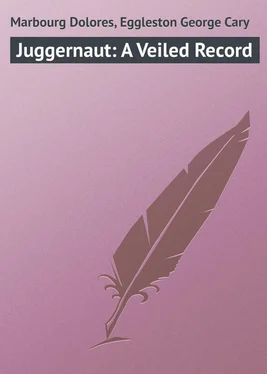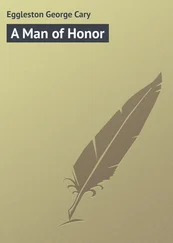George Eggleston - Juggernaut - A Veiled Record
Здесь есть возможность читать онлайн «George Eggleston - Juggernaut - A Veiled Record» — ознакомительный отрывок электронной книги совершенно бесплатно, а после прочтения отрывка купить полную версию. В некоторых случаях можно слушать аудио, скачать через торрент в формате fb2 и присутствует краткое содержание. Жанр: foreign_prose, на английском языке. Описание произведения, (предисловие) а так же отзывы посетителей доступны на портале библиотеки ЛибКат.
- Название:Juggernaut: A Veiled Record
- Автор:
- Жанр:
- Год:неизвестен
- ISBN:нет данных
- Рейтинг книги:5 / 5. Голосов: 1
-
Избранное:Добавить в избранное
- Отзывы:
-
Ваша оценка:
- 100
- 1
- 2
- 3
- 4
- 5
Juggernaut: A Veiled Record: краткое содержание, описание и аннотация
Предлагаем к чтению аннотацию, описание, краткое содержание или предисловие (зависит от того, что написал сам автор книги «Juggernaut: A Veiled Record»). Если вы не нашли необходимую информацию о книге — напишите в комментариях, мы постараемся отыскать её.
Juggernaut: A Veiled Record — читать онлайн ознакомительный отрывок
Ниже представлен текст книги, разбитый по страницам. Система сохранения места последней прочитанной страницы, позволяет с удобством читать онлайн бесплатно книгу «Juggernaut: A Veiled Record», без необходимости каждый раз заново искать на чём Вы остановились. Поставьте закладку, и сможете в любой момент перейти на страницу, на которой закончили чтение.
Интервал:
Закладка:
The loneliness of his life was good for him for a time. It taught him to find a sufficient companionship in his own mind – a lesson which all of us need, but few learn. But the time came when his wise mother saw the necessity of a change, and, scant as her resources were, she took him to the little city of Jefferson, where the schools were good and companionship was to be found.
The city was at that time a beautiful corpse. It had just died, and had not yet become conscious of the fact. Ten or fifteen years before, a railroad running from the State capital had made its terminus at Jefferson, making the river town the one outlet of the interior. A great tide of travel passed through the place, and a large trade centred there. But the course of railroad development which gave the city life, destroyed it later. Other railroads were built through the interior to other river outlets, and Cincinnati and Louisville took to themselves what had been Jefferson's prosperity.
And so when Edgar Braine first knew the town, it had lost its hold upon life, though it had not yet found out what had happened to it. The great rows of warehouses along the levee, with the legends "Forwarding and Commission," "Groceries at Wholesale Only," "Flour, Grain and Provisions," "Carriage Repository," and all the rest of it, staringly inscribed upon their outer walls, were empty now, and closed. In West Street, two only of the once great wholesale houses maintained a show of life. In one, an old man sat alone all day, and contemplated three bags of coffee and two chests of tea, for which no customer made inquiry. In the other there remained unsold half a ton of iron bars, and a few kegs of nails, to justify the assertion of the signboard that the proprietors were dealers in "Iron and Nails." The two partners who owned the place appeared there every morning, as regularly as when their sales were reckoned in six figures. They were always scrupulously neat, always courteously polite to each other, and always as cheerful and contented a pair of business partners as one need desire to see. Why not, seeing that they both liked the game of checkers, and had nothing to do but sit in the doorway and play from the beginning to the end of "business hours" every day?
But the town did not realize its condition yet. Weyer & McKee were putting up a new and imposing building for the better accommodation of their wholesale grocery business, inattentive to the fact that their wholesale grocery business had ceased to be. Polleys & Butler were still issuing their Market Bulletin for the information of their "customers," not having yet realized that their customers had permanently transferred their custom to Cincinnati. In this interesting little sheet they had not yet begun to discuss "The Present Depression in Trade – Its Cause and Cure." That came a little later.
The city was very well satisfied with itself. It had water-works and gas, broad streets, and comfortable houses in such abundance that every family might have had two for the asking. The people did not greatly mind their loss of prosperity. Those who did mind had already gone away; those who remained had succeeded, during the days of activity, in getting out of other people enough to live on comfortably, and were content to enjoy leisure and occupy themselves with church work and the like for the rest of their lives.
The boy did not discover that anything was amiss with Jefferson until two or three years after his arrival there. Having seen no other city he did not observe that there was anything peculiar in the condition of this one, until he saw a "to let" notice on the gorgeously decorated front of Fred Dubachs' "Paintery" and learned that Fred was about to remove to Keokuk. Fred was a notably expert painter, and the front of his shop had always a strong fascination for Edgar. Fred had lavished his best skill and industry upon its ornamentation during the two or three years since he had ceased to have any painting to do for others. Now he had given up and was going away.
The thing set the boy thinking. He reflected that it would be a sad waste of time and labor for Fred to paint any more signs for a town which already had some thousands no longer serving any useful purpose. As he followed out this suggestion it dawned upon him that perhaps Jefferson was a city in decay, and when he had questioned the matter a little further, the evidence all about him left no room for doubt.
Then he went home and said to his mother: "I will not live in Jefferson after I finish at Hanover. This town is done for. I must have opportunities, and there will never be any here."
But Jefferson's condition had been educating him all the time, and shaping his character in ways which affected all his future. He saw this clearly now as he paced his room in Thebes that night after the suicide, and recalled it all.
Among his schoolmates in Jefferson there were some, the sons of vulgar people who had grown rich in the rapid rise of the town. These were mainly stupid and arrogant, and their insolence was unceasing. At first it had stung the sensitive boy to that kind of protest which involves blows and bloody noses.
He was lithe of limb and strong, and he usually managed to get a sufficient revenge in that way to satisfy him. But something occurred at last to spoil the enjoyment he got out of pommelling the young bullies, and to show him that, with all his strength and agility, he was meeting his adversaries on unequal terms. He accidentally saw his mother toiling late at night over the clothes in which he had that day fought Cale Dodge to a finish. Cale, he knew, would simply put on a new suit next day.
"I will have no more fights of that kind," he said to himself. Then, after a period of silent thought, he said aloud:
"I have better weapons. I will show them in class who is master."
From that hour the inattention to books which had given his mother some uneasiness, ceased. He mastered every lesson days before it was assigned to him, and when an opportunity offered he submitted himself to examinations in advance, and passed into the higher grades of the high school, leaving his adversaries behind.
In this process he acquired two unquenchable thirsts – the one for knowledge, the other for power. He searched the town library for books that might supplement the meagre instruction of the schools. In his search for knowledge he found culture. General literature opened its treasures to him, and he read everything, from Shakespeare to Burke's Works, that the library could supply.
But while all this went on, his delight in his superiority to the youths who had been insolent to him, and were so still, crystallized more and more into a great longing for power, and a relentless determination to achieve it. Cost what it might he must be great, and look down upon these his foes. His ambition became a passion, wild and unruly, but he resolutely curbed it as one controls a spirited horse, and for the same reason. He did not mean to let the ambition run away with his life and wreck it before the destination was reached.
In the little college ten miles away, when at last he entered there, he was said to have no ambition, because he lightly put aside the petty prizes and honors for which others struggled so eagerly. His mates did not dream how ambitious he was. He was thinking of larger things. There was a scholarship to be won, and he took that, because it would spare him his tuition fees; but for the class and society "honors" he cared not at all.
He made his own all of value that the college libraries held and when the senior examinations were over he was without a rival near him on that record of achievement which determines who shall be valedictorian. But he placed no value on the empty honor so coveted by others. A month remained before Commencement, and he had no mind to lose a month. He said to the President:
Читать дальшеИнтервал:
Закладка:
Похожие книги на «Juggernaut: A Veiled Record»
Представляем Вашему вниманию похожие книги на «Juggernaut: A Veiled Record» списком для выбора. Мы отобрали схожую по названию и смыслу литературу в надежде предоставить читателям больше вариантов отыскать новые, интересные, ещё непрочитанные произведения.
Обсуждение, отзывы о книге «Juggernaut: A Veiled Record» и просто собственные мнения читателей. Оставьте ваши комментарии, напишите, что Вы думаете о произведении, его смысле или главных героях. Укажите что конкретно понравилось, а что нет, и почему Вы так считаете.












